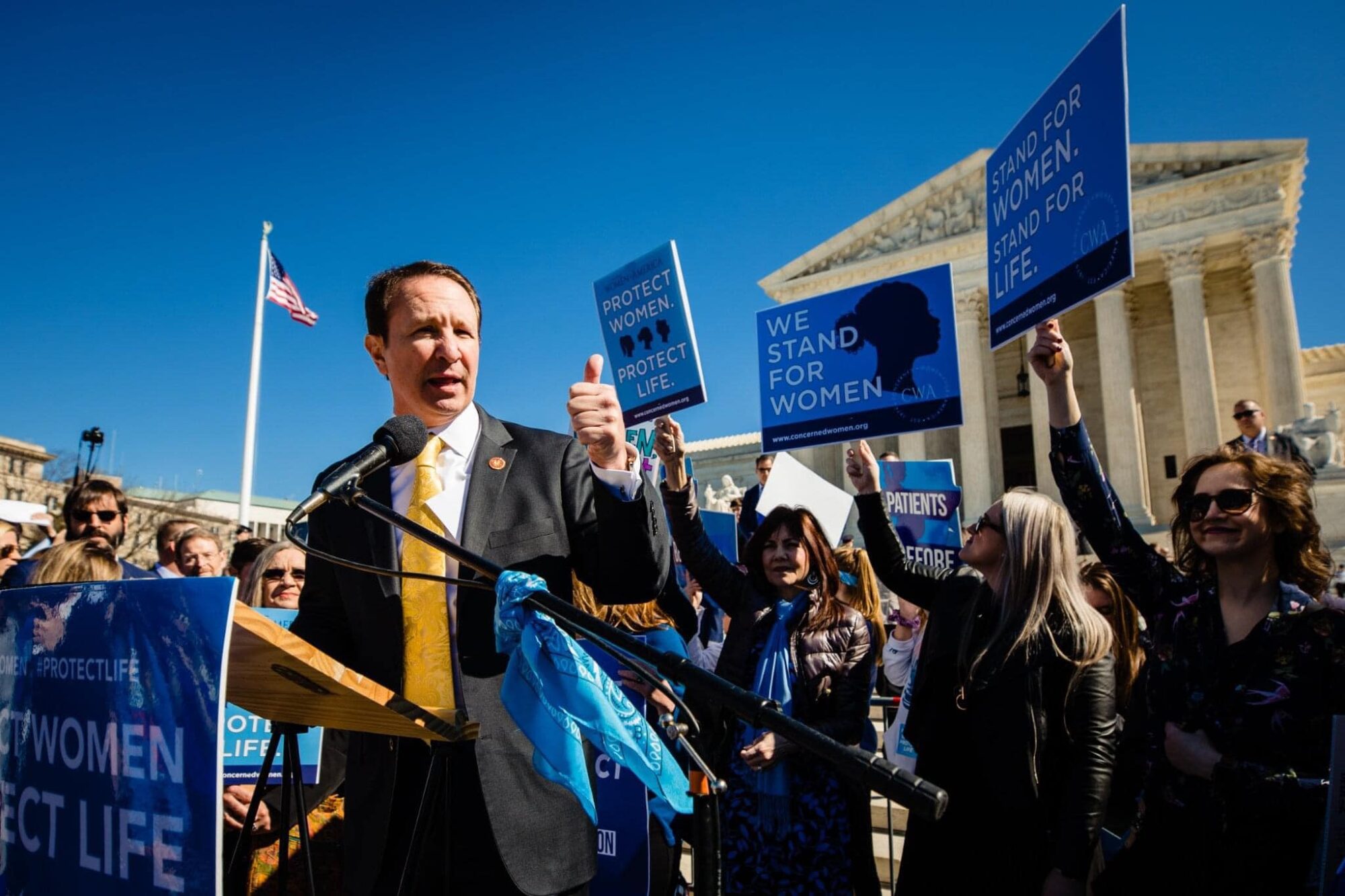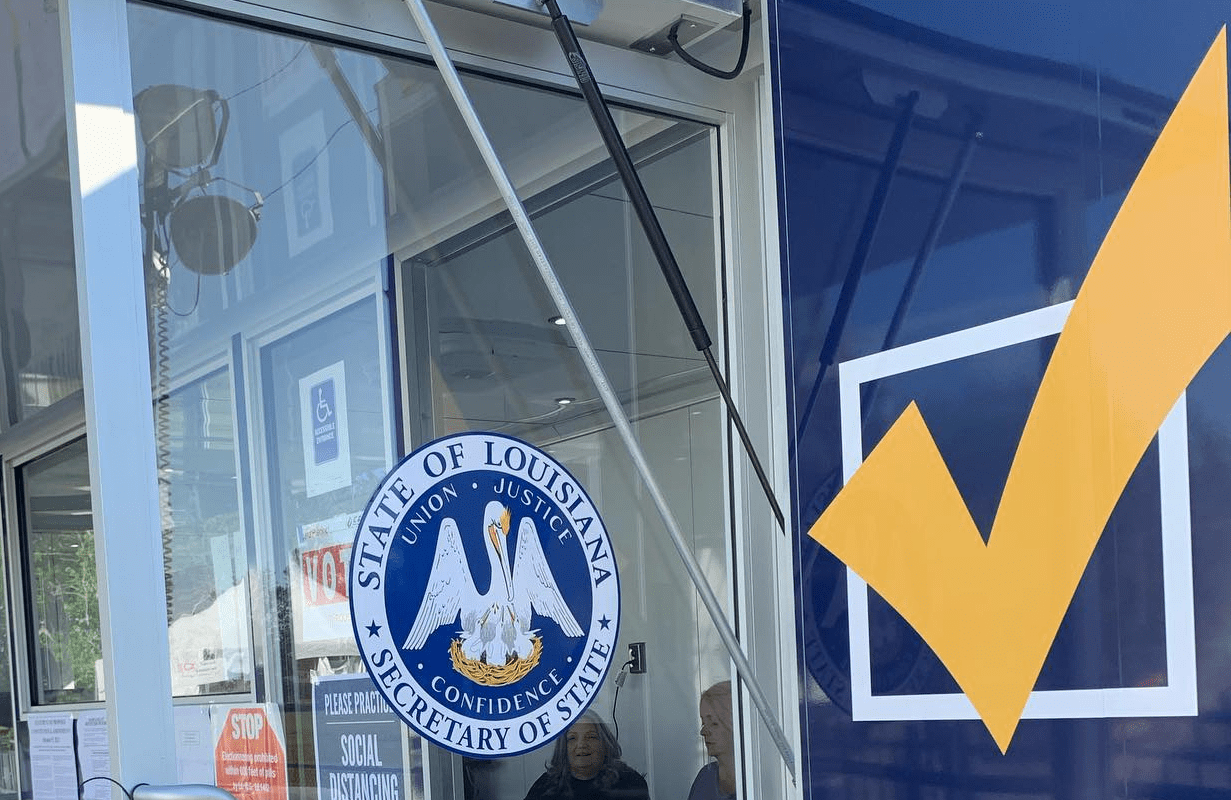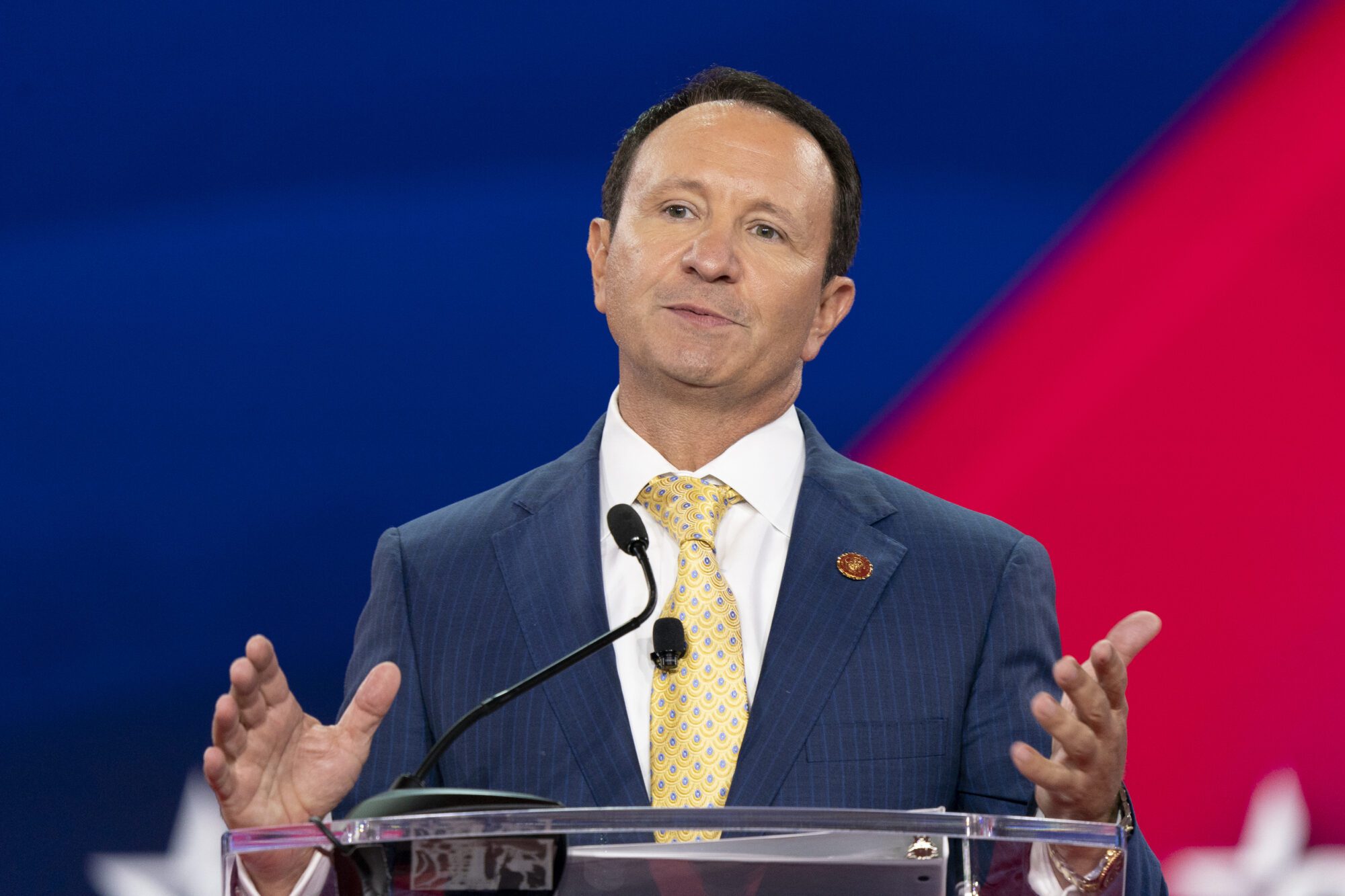Louisiana Takes a Hard Swing to the Right
A new governor, emboldened conservatives, threats to New Orleans, and election conspiracies: Seven takeaways from Saturday’s elections in Louisiana.
Daniel Nichanian | October 16, 2023


Louisianans pushed their state even further to the right on Saturday, electing an arch-conservative governor who will now get to run the state alongside like-minded lawmakers who control the legislature.
A boon for the GOP, the results will have stark consequences for state policy, easing the way for new legislation that would target LGBTQ+ residents, and empowering politicians who have championed draconian anti-crime measures and attacks on public education. They will likely set up more clashes between the conservative state government and the city of New Orleans.
The results also signaled that election conspiracies continue to resonate with the GOP base, as several campaigns emerged triumphant after fueling false allegations of fraud during a critical juncture for the state’s voting systems. Jeff Landry, the incoming governor, tried to help Donald Trump overturn the results of the 2020 presidential election as attorney general, and he doubled down on his alliance with the former president during his campaign this year.
Bolts covered the elections in the lead-up to Oct. 14, with an eye to its ramifications for criminal justice and voting rights. Below are seven takeaways on the results.
1. Landry’s win hands the GOP a new trifecta
Jeff Landry, the state’s arch-conservative attorney general, easily prevailed in the governor’s race on Saturday, receiving 52 percent in a 16-person field. He will replace John Bel Edwards, a Democrat who was barred from seeking reelection due to term limits.
Landry’s victory hands Republicans full control of the state government for the first time since 2015, since his party also defended its large majorities in the state House and Senate.
The result will free conservative policy ambitions, which were held back over the last eight years by Edwards’ veto power. Even when the GOP gained a supermajority capable of overriding Edwards’ vetoes earlier this year, it remained frequently unable to do so. This summer, for instance, the GOP failed to muster the votes to override Edwards on a bill that would have prevented discussion of sexual orientation and gender identity in schools.
Landry is sure to bring an entirely different outlook on such issues. Throughout his career, he has pushed Louisiana to restrict LGBTQ+ rights and block teaching of such issues in education, including at the collegiate level. Last year, Landry created a new tool for people to file complaints against teachers and libraries. He has also worked for the state to obtain information about Louisiana residents who travel out of state to obtain gender-affirming care or abortions.
Landry has fiercely fought local and state reforms meant to reduce the state’s near-record incarceration rate, Bolts reported in a profile of the attorney general in August. This year alone, he ran ads lambasting “woke DAs,” fought efforts by Louisianans on death row to seek clemency, and championed a measure, which ultimately did not pass, that would have opened the criminal records of children as young as 13 to the public—but only in three predominantly Black parishes.
2. Things are about to get more complicated for New Orleans
Republican-run states commonly preempt liberal policies adopted in their cities, so just the fact that the GOP gained a trifecta in Louisiana would put New Orleans in a tough spot. But beyond that, Landry has been particularly aggressive in undercutting his state’s most populous city. As attorney general, he retaliated against New Orleans officials when they crafted policies to protect immigrants and to shield residents from anti-abortion laws, proposing to withhold flood protection funds. He has also undermined efforts to reform New Orleans police while also setting up a short-lived state task force with the authority to make arrests in the city.
And Landry has made it clear he would double down as governor, telling Tucker Carlson last year that the governor’s office in Louisiana “has the ability to bend that city to his will,” and that “we will.”
New Orleans voters on Saturday signaled their appetite for a very different politics. Landry received less than 10 percent of the vote in the city, far behind Democrat Shawn Wilson who drew 71 percent. A former public defender with some progressive support, Leon Roché, also defeated a former prosecutor for a position as criminal court judge in the parish. And one of Louisiana’s most left-leaning lawmakers, Mandie Landry (no relationship to Jeff Landry), defeated more centrist challengers in a heated state House race for an uptown district.
On Sunday, even as she celebrated her own win, Mandie Landry said she was preparing for a “sobering” stretch for her city. “I think there is going to be more of a push from Baton Rouge to interfere in New Orleans than usual,” she told Bolts. “I am not under any delusions.”
3. This was a low-turnout election
For an election that will deeply affect Louisiana, engagement was very low: just 36 percent of registered voters turned out on Saturday.
Turnout fell sharply in the state’s two most populous urban regions, which vote very Democratic. Compared to the 2020 presidential election, the number of voters who cast a ballot fell by 60 percent in New Orleans and by 52 percent in East Baton Rouge Parish. In the rest of the state, it only fell by 49 percent.
Mandie Landry, the New Orleans lawmaker, faults the state Democratic Party for doing little outreach to her city’s voters. Compared to the “huge efforts to get out the vote” she witnessed in 2015 and 2019, “there was none of that this time,” she told Bolts. “I didn’t see any get out the vote effort.” The state Democratic Party, which scarcely spent money in the run-up to the primary, did not respond to a request for comment.
4. Secretary of state race heads to a runoff, but a new frontrunner emerges
Republican Secretary of State Kyle Ardoin has tried to appease election conspiracists since 2020, for instance quitting a multi-state consortium that monitors voter registration after false claims that it was tied to George Soros. With Ardoin retiring this year, the big question on Saturday was which of the many Republican candidates would advance to a runoff.
Ardoin’s deputy Nancy Landry (no relation to Jeff Landry or Mandie Landry) barely edged out her rivals, coming in first with 19 percent. Bolts reported earlier this month that, much like her boss, Landry has resisted election deniers’ most radical proposals while also echoing unfounded suspicions of voter fraud and election irregularities.
Mike Francis, the Republican who most firmly rejected election conspiracies, very narrowly lost out on a runoff spot, coming in third with 18 percent. Brandon Trosclair, a little-known businessman who ran as a hardline election denier and called for fully hand-counting ballots, got 6 percent.
Landry will now face Democrat Gwen Collins-Greenup, an attorney who snatched the second runoff spot. Collins-Greenup got 19 percent as well, but Landry will be the clear front-runner since all Republican candidates combined for 68 percent of the vote cast on Saturday. The state is at a crossroads on election administration since it has to soon replace its outdated voting equipment, an issue around which the far-right has mobilized.
5. In first referendum inspired by “Zuckerbucks,” voters ban private election grants
Voters overwhelmingly approved Amendment 1, a measure that will block Louisiana’s election offices from receiving private grants from outside organizations.
A non-profit with ties to Facebook founder Mark Zuckerberg donated hundreds of millions of dollars in 2020 to local election offices nationwide, in order to help them run elections during the early pandemic. The right quickly dubbed these grants “Zuckerbucks,” fueling conspiracies about election interference, and many GOP-run states proceeded to pass laws to ban such grants. To circumvent the Democratic governor’s veto, Republican lawmakers in Louisiana placed such a ban directly on the ballot for the first time.
Some elections experts critical of such bans share the reservations about private money flowing into elections, but they also stress that public funding is woefully inadequate, and that the bans risk further starving cash-strapped offices, threatening election security rather than protecting it.
“Nobody’s got money to pay election officials what they’re worth (particularly in this new environment), to invest in new systems, to make improvements to back-end security,” Justin Levitt, a voting expert who now teaches at Loyola Law School, told Bolts on Sunday. “If the state actually responded by funding the elections we deserve, banning private money wouldn’t be the worst outcome. Private donations were only ever there to stop the bridge from collapsing entirely. They never should have been necessary. Yet they were.”
He added, “I think we can all hope that we’re not dealing with that kind of 10-alarm fire in 2024.”
6. In sheriff’s races, a sea of white men—again
Sixty-three parishes held sheriff elections, and only three even featured women running for the office. All lost on Saturday.
This means that all 63 parishes have elected a man, or are sure to do so after the Nov. 18 runoffs. This dynamic is nothing new: All of these parishes already have a male sheriff.
Nearly all incoming sheriffs will also be white. Across these 63 parishes, only three elected a Black sheriff on Saturday, with Black candidates advancing to a runoff in three additional parishes. By contrast, 57 of these 63 parishes elected a white sheriff on Saturday or will do so after the runoff. Louisiana’s population is 30 percent Black.
This pattern is symptomatic of the societal biases regarding what law enforcement should look like, though breaking it up would not in itself change brutal conditions and treatment inside the state’s jails. And here again, New Orleans stands out from the rest of the state.
Its sheriff, Susan Hutson, is a Black woman who took office in 2022 (New Orleans holds its elections on a different cycle than all other parishes, and so Hudson was not on the ballot this fall). “As a woman and as a Black woman, I go through additional types of microaggressions in the job,” Hutson told Verite News last year. “So just having somebody else there who might be experiencing something similar with me, it’s good—it’s good to see someone like you.”
7. East Baton Rouge sheriff secures another four years
The jail in Louisiana’s most populous parish is notorious for an alarming death rate and for the brutal treatment of people detained there. But, as Bolts reported in August, organizers and civil rights lawyers have run into Sheriff Sid Gautreaux, who has overseen the facility for 15-plus years, boosted by campaign contributions from people and groups that benefit from more jail spending.
Gautreaux won reelection with 86 percent of the vote on Saturday. He is a Republican in a heavily blue jurisdiction but he faced no Democrat; two opponents were kicked off the ballot over the summer, though neither was expected to mount a serious challenge to the entrenched sheriff.
Reverend Alexis Anderson, co-founder of the East Baton Rouge Parish Prison Reform Coalition, a local organization that has pushed back against the sheriff’s practices, told Bolts on Sunday that she would continue to demand accountability regardless of these results. “I stand committed to working towards independent investigations of each and every death that has occurred in that facility under the Gautreaux administration,” she said. “We will continue engaging our community on the development of real public safety tools.”
Anderson added, “There are too many lives at stake to become discouraged.”
Piper French contributed reporting for this article.
Sign up and stay up-to-date
Louisiana Votes
Bolts is closely covering the ramifications of Louisiana’s 2023 elections for voting rights and criminal justice.




